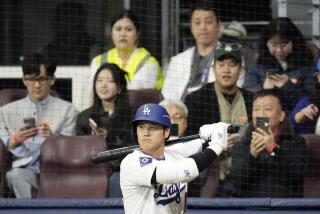Toward Closing the Korea-Japan Gap
- Share via
With the new administration led by Kim Dae Jung inaugurated in Korea in February and the brand-new administration of Keizo Obuchi in Japan, both governments are jockeying for a stronger position in anticipation of the state visit by Kim to Japan next week.
Korea is deeply involved in trying to rescue itself from its economic crisis and must negotiate the best possible terms with Japan, its largest creditor nation. In fact, this need overshadows anything else that Kim wants to accomplish in improving Japanese-Korean relations. He has repeatedly signaled as much by pledging that he will finally allow Japanese “culture”--meaning films, videos, songs, etc.--to reenter Korea and that instead of making an issue out of what Japan did in Korea during its colonial rule, he looks forward to more “constructive relations” with Japan in the coming century.
Japan, by the same token, has announced its intention to reach an agreement on the Japan-Korea Fisheries Treaty. However, the newly appointed Japanese foreign minister, Masahiko Komura, has expressed skepticism about developing a two-country “consensus” on historical issues. And as if to remind people of the difficulty of agreeing on the past, Shoichi Nakagawa, the new Japanese agriculture, forestry and fisheries minister, began his term in office by flip-flopping in his public views on whether wartime “comfort women” were or were not forcibly recruited.
So even if Kim wants to bypass the nasty issue of past Japanese-Korean relations, Japan seems to have less intention of accommodating Korea. A joint committee to study the historical past of Japan and Korea was inaugurated more than a year ago. At first, both sides had difficulties in coming up with a suitable list of three members on each side. Japan finally selected a panel that included a former Foreign Ministry official and a political science professor, while Korea selected more traditional history specialists. After failing to agree on an agenda at the first session, one of the Japanese members concluded that reaching a consensus view on the two nations’ past was impossible.
Disentangling the present from the past is always difficult. Allowing Japanese cultural properties into Korea was once seen as a potential threat to the proud cultural heritage of the Koreans. Behind this fear, of course, lay the fact that during the 40-year Japanese occupation, 1905-45, Koreans were not allowed to retain their names, language or other aspects of their culture.
But today the threat is different, although perhaps more serious. First, the Japanese would demand enormous royalty payments from Korean impostors of Japanese culture, and this in turn might promote renewed Korean protests against Japan, including not only over the royalty payments but also rejecting on principle “things Japanese.”
Kim So Un, a generation ago the leading Japanologist in Korea, aptly observed that throughout its history Japan has been essentially a “taker” of foreign culture, including Korea’s, and never a “giver.” Japanese tend to forget that for thousands of years Korea freely exported its arts and culture to Japan.
Thousands of Korean cultural artifacts were also forcibly removed from Korea by Japan during the war and never returned, despite Japan’s promises to do so. Some people have suggested that Japan’s past indebtedness to Korean culture and the cultural artifacts still held in Japan should be weighed in the negotiations over Japan’s current desire to export its popular culture to Korea.
The Japanese government has hinted at its desire to have Emperor Akihito attend the World Cup opening ceremony in Seoul in 2002. Japanese reports also indicate Akihito’s personal wish to visit Korea, the only country formerly under Japanese control that he has not yet visited, in order to express his personal regrets over the unfortunate past.
It would be timely for the Japanese people and their government to start this process by offering their apologies and amends for past deeds in Korea, and at the same time acknowledge their own indebtedness to Korean culture.
More to Read
Sign up for Essential California
The most important California stories and recommendations in your inbox every morning.
You may occasionally receive promotional content from the Los Angeles Times.













